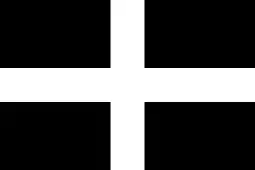Kernewek Lowender
The Kernewek Lowender (officially the Kernewek Lowender Copper Coast Cornish Festival) is a Cornish-themed biennial festival held in the Copper Coast towns of Kadina, Moonta and Wallaroo on Yorke Peninsula, South Australia. 'Kernewek Lowender' means 'Cornish happiness' in the Cornish language. It is held in the late autumn starting on the second Monday of May, in odd-numbered years. The Kernewek Lowender claims to be the world’s largest Cornish Festival outside Cornwall.[1]
Activities
The festival is held over seven days with the highlight being 'The Big Weekend', featuring three large fairs: the Village Green Fair, Fer Kernewek, and a Classic Cavalcade of Cars (with over 500 vintage cars and motorcycles).[2] Traditional Cornish food, such as Cornish pasties and Swanky beer is served during the Festival. maypole performances, furry dancing, and the selection of a May Queen are also included.[3] Other events include a street parade, a bake-off, the Gathering of the Bards and the Dressing of the Graves. The event has grown in popularity, and the 2013 (40th anniversary) festival attracted an estimated 37,000 people from intrastate, interstate and overseas, and included a record 43 events and 15 associated activities.[4] As of 2017, the region now hosts more than 45,000 visitors during the festival.[5] A number of participants also dress up in traditional costumes as Cornish Jacks and Cornish Jennies.
History
The festival was instigated by local businessmen such as Keith Russack, and Premier Don Dunstan in the early 1970s as an initiative to boost the then economically depressed Copper Coast. The original Cornish Festival committee formed Kernewek Lowender Incorporated in 1972, and chose the May long weekend for the festival. The first festival went ahead in 1973 with the assistance of a A$1000 grant from the South Australian government and exceeded the organisers' expectations. The region hosted 20,000 visitors during the festival, with 11,000 attending the Fer Kernewek (Cornish Fair) in Moonta, 15,000 visiting the Moonta Mines Museum, and 8,000 Cornish pasties consumed.[5] Dunstan himself later recalled: "When I proposed the establishment of a Cornish Festival, in Australia's "Little Cornwall", people of Cornish descent came flocking."[6]
Traditionally the festival culminated in a 3-day long weekend with events in each town for one day of the long weekend. However, when the Adelaide Cup Day public holiday was moved,[7] difficulties were experienced in scheduling events with only two days for the three towns, and concerns were raised over whether Wallaroo received enough focus.[8] Early in 2011, the ability to market Cornish pasties by that name at the festival was cast into doubt, following a trademark ruling by the European Commission.[9] The Cornish pasty was awarded Protected Geographical Indication (PGI) status and it was unclear whether the European ruling would force Australian retailers to rename their pasty products to comply.[10]
Festival dates
- 2011: 9–15 May[11]
- 2013: 21–26 May
- 2015: 17–24 May
- 2017: 19–21 May
- 2019: 13–19 May
- 2021: 17–23 May (subject to cancellation)
See also
References
- "Kernewek Lowender". Retrieved 2008-04-12.
- "South Australia Kernewek Lowender". Archived from the original on 2010-07-21. Retrieved 2009-11-18.
- "Kernewek Lowender 2009". Retrieved 2009-11-18.
- History of the Kernewek Lowender Accessed 2017-08-30
- "Kernewek Lowender Official Site". Retrieved 2017-08-31.
- Payton, Philip, Making Moonta: The Invention of Australia's Little Cornwall
- "Holidays: Adelaide Cup in Australia". Retrieved 2009-11-18.
- "Kernewek Lowender... Was Wallaroo left out of the loop?". Archived from the original on 2015-05-30. Retrieved 2009-11-18.
- "Cornish ruling worries Aussie pasty makers". ABC News Online. Australian Broadcasting Authority. 4 March 2011. Retrieved 8 March 2011.
- Poirier, Agnès (23 February 2011). "Putting the Cornish back into pasties". The Guardian. Retrieved 2 March 2011.
- "Kernewek Lowender evaluation positive". Archived from the original on 2016-03-03. Retrieved 2009-11-18.
